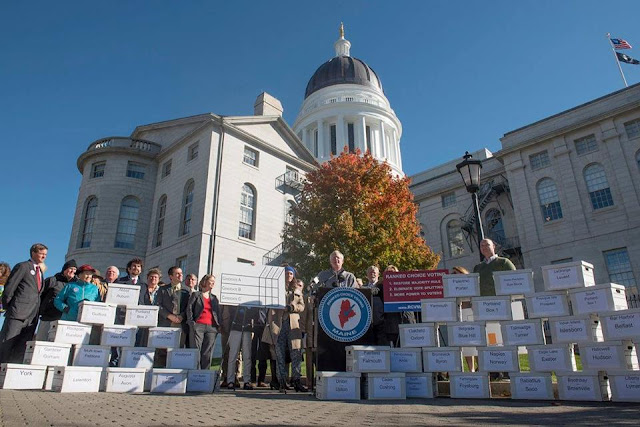Political junkies, news hounds, concerned citizens: a course
for you is coming to a location in your own home via ZOOM. ZOOM is a video
conferencing platform similar to SKYPE, but better. SAGE (Seniors Achieving
Greater Education) is offering “The Power and Influence of Big Money.” Co-instructors
Alice Bolstridge and Nancy Roe expect lively discussion in this class about
effects of big money on legislative policy and people’s lives. Selected
readings from research and Alice’s book in progress will provide discussion
prompts.
 |
| Reflections of a Pacifist Private in Maine's Culture Wars ALICE BOLSTRIDGE |
The class will review some of the most exciting and
contentious events of this legislature. Partisanship, referred to as tribalism
in the book, interferes with solving problems, and in this session legislators fought in court and in the Senate about how to implement the Ranked
Choice Voting law passed by voters in referendum. They fought about the bill to give Bath Iron Works a 6-million-dollar tax
subsidy. And they fought fiercely about the bill to adjourn the session on
schedule or to continue to work on unresolved issues. We’ll talk about how
corporate power influences legislative decisions in these and other important
and continuing issues: income inequality, the environment, health care,
education, and other concerns that affect our daily lives.
Maine’s ideological conflicts reflect fights going on nationally and in many cases globally. We will discuss how these issues are continuing in the 2020 elections, and we will explore possibilities for solutions to the problems.
Delivering Petitions for Ranked Choice Voting
Maine’s ideological conflicts reflect fights going on nationally and in many cases globally. We will discuss how these issues are continuing in the 2020 elections, and we will explore possibilities for solutions to the problems.
We like participants to bring their own interests and experience of the topics into discussions. “The personal is political and vice versa.” I don’t remember who said that.
The class is limited to 10 participants plus the 2 instructors,
so if you want to take this adventure with us, here’s how: To register for the class from wherever you
are in the world, go to https://msad1.coursestorm.com/course/sage-the-power-and-influence-of-big-money?page=3.
There is a $25.00 SAGE membership fee and
a $5:00 course fee which you can pay online.
Nancy will offer tutorials in the use of ZOOM. It is easy; you don’t even have to open a ZOOM account. You only need access to a computer with a camera and a microphone, an email address, and Nancy’s simple instructions and encouragement. What is Zoom and how does it work? See https://sitelicense.ucr.edu/files/zoom_for_instructors.pdf.
Course
Schedule: Tuesdays, February 4, 11, 18, 25; 9:30- 11:30 AM.
ZOOM tutorial dates on line: Tuesdays, January 21, 28, 2020;
9:30-10:30 and other times as needed.
Instructor bios:
- Alice Bolstridge, Ph. D., is a retired English instructor, writer, and political activist. More information at https://www.facebook.com/aliceandmoore or https://alice1938.blogspot.com/. Contact bolstridgea38@gmail.com for questions and concerns about content of the course.
- Nancy Roe is a founding member of SAGE, a member of the SAGE Board of Directors, a lifelong learner, and a ZOOM enthusiast. For ZOOM or SAGE membership concerns, contact nancyproe@gmail.com .






















